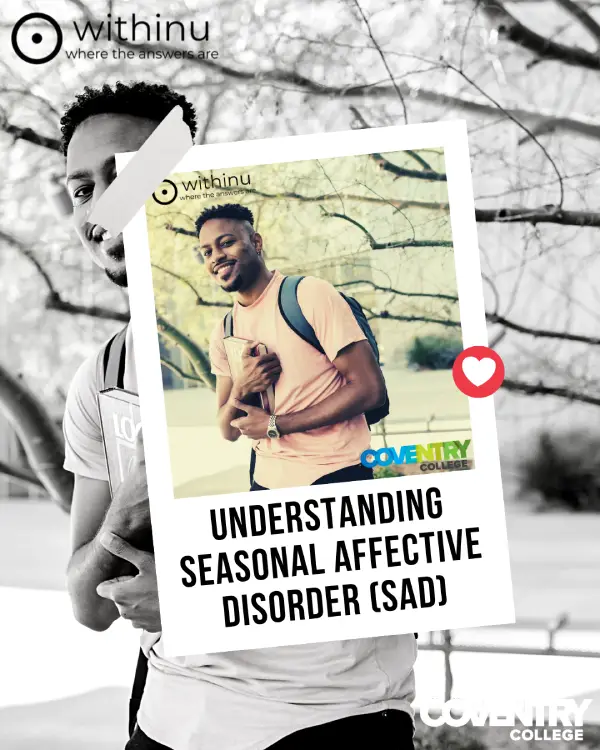Ever noticed your mood taking a dive when winter rolls around? Or are you finding it harder to get out of bed for your morning classes? You’re not alone – and it might not just be the usual winter blues.
Let’s talk about Seasonal Affective Disorder (SAD) and what it means for you.
What Is SAD?
Seasonal Affective Disorder is more than just not being a fan of cold weather. It’s a form of depression that follows a seasonal pattern, typically hitting hardest during winter months when days are shorter and darker. Think of it as your brain’s response to reduced sunlight and changing seasons.
How Might SAD Affect Your College Life?
SAD can impact you in ways that might not affect others quite the same:
In Your Studies:
- Finding it hard to concentrate in class? SAD can make focusing on lectures and coursework feel like wading through treacle
- That assignment deadline that seemed manageable in September might feel overwhelming in December and January
- Group projects might feel more challenging when your energy levels are low
- Revision and exam preparation can become extra challenging when dealing with SAD symptoms
In Your Social Life:
- You might find yourself saying “no” to hanging out with friends more often
- Social events that you’d normally enjoy might start feeling like too much effort
- Your usual hobbies and interests might not bring the same joy they usually do
At Your Job
- Getting through shifts might feel more draining than usual
- Managing and interacting with people could feel more challenging
- Balancing work and studies might seem more overwhelming
Common Signs to Watch For
Here’s what to look out for:
- Feeling persistently low, especially as the days get shorter
- Having trouble getting up for morning classes (more than the usual student struggle!)
- Craving carbs and comfort food more than usual
- Finding it hard to stay focused during lectures or while studying
- Feeling more irritable with other people including friends and family
- Lacking the energy you usually have for activities you enjoy
- Changes in your sleeping patterns – usually wanting to sleep more
Practical Ways to Cope with SAD
At College
- Try to sit near windows during classes when possible
- Take short walks during your breaks, especially at lunchtime
- Stay connected with your classmates – isolation can make symptoms worse
- Break assignments into smaller, more manageable chunks
- Use your free periods for both studying AND self-care
Outside College
- Make the most of natural daylight – even a 15-minute walk helps
- Keep your curtains open during the day
- Try to maintain a regular sleep schedule (yes, even on weekends!)
- Stay active – whether that’s team sports, the gym or just regular walks
- Eat well – though it’s fine to enjoy those carb cravings in moderation
- Consider getting a light therapy lamp for studying at home
- Keep up with your hobbies – they’re more important than ever
When to Seek Help
If you’re finding that SAD is affecting your studies, work or daily life, it’s important to reach out. You don’t have to handle this alone. The College Wellbeing Coaches can help and you can find external support via The Hub of Hope.
Remember…
SAD is a real condition that affects many students – it’s not just “being lazy” or “feeling a bit down.” Understanding what you’re dealing with is the first step to managing it effectively. With the right support and strategies, you can navigate your studies and daily life successfully, even during the darker months.
Remember, there’s absolutely nothing to be ashamed of if you’re experiencing SAD. Just like any other health condition, it’s not your fault, and it doesn’t define you.
Being open about how you’re feeling and seeking support shows strength, not weakness.
LISTEN TO THIS ARTICLE BELOW



